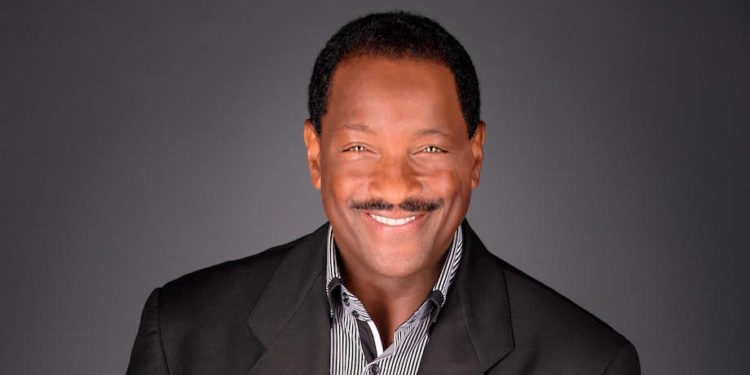
From the Xen Lounge in L.A. to a set that’s reminiscent of BET’s Video Soul, legendary talk show host Donnie Simpson is back at home on the couch for TV One’s second season of Donnie After Dark.
“When we started taping this season, I felt like I was back in stride again, like the Frankie Beverly song. I love this format, this is the show I want to do. I’m really comfortable with this,” Simpson revealed.
There are only two more shows left in this season, so JET caught up with Simpson to talk about why Donnie After Dark is vital to the music industry.
JET: What is the premise for the show Donnie After Dark?
Donnie Simpson: Donnie After Dark is basically a late night talk show. I come out and I do a joke-less monologue because I’m not a comedian. I don’t have a desk. I wanted a couch and a chair because I thought that it would take it back to Video Soul and that’s what makes me comfortable. So we have different guests from music, sports, and various worlds. We have a performance every week, this week we have 112, next week we have Musiq Soulchild.
I think the greatest compliment I get out on the streets is that people feel like they are sitting on the couch with my guests and that’s exactly what I want it to feel like that.
JET: Did you set out to create that type of vibe for the show?
Simpson: It’s not by design that I went in thinking I want people to feel like they are hanging with me. It’s just how people feel when they watch the show or hear me on the radio. For me, that’s exactly what it is, I just like to hang with people. The cameras are stripped away, and I’m just kicking it with you. It’s not a standard interview if you will. I don’t come with prepared questions. Nine times out of ten, my next question is going to come from something that you just said. I’m listening because it’s a conversation. I want to know you. I don’t have to read the bio and have all this knowledge before talking to you. The same thing with the viewers, they want to get to know you.
JET: In previous interviews, you mentioned that Donnie After Dark is also here to save Black music, can you elaborate?
Simpson: That is one of the reasons I came back to do television. For 15 years, super producers, Jimmy Jam and Terry Lewis tried to talk me into coming back and they would always say, ‘We need you,’ when talking about R&B music in particular. They would talk about how it doesn’t have the outlets that it used to have and I see it.
I look at the charts with great sadness and I think about the days when you’d look at the Billboard Top 100 and see the O’Jays, the Temptations, the Ohio Players, and Michael Jackson of course. You would see all these R&B players in the mix. Now, it’s pretty much pop and hip-hop. I would just like to be a part of something that helps to save that; just to give these R&B artists another stage for them to show what they do. There are a lot of great artists that create great music that just don’t have the outlets to present their stuff anymore.
JET: What are the major differences you have seen this time around versus when you were on television with Video Soul?
Simpson: For one, it’s different being on one hour every week versus two hours every night plus repeats. Also, the landscape has changed. There’s more of a fight now to carve out your space in television. When I was on Video Soul, for Black programming, BET was all we had at that time. Now, just in the Black arena alone, you have Centric, BET, TV One, and the programming that’s on WEtv.
JET: What has been your most memorable interview ever?
Simpson: There’s so many. One of the most memorable would have to be with Barry White. We did a 2 hour special with him from Atlantic City and it was amazing. First of all, Barry couldn’t stop cursing (laughs). Everyone knows him as the love master, but Barry was a gang banger in L.A. at a young age. He just kept cursing and thank goodness we were taping it, and it was just so funny. One thing that makes it memorable is because of something he said that was so unique. We were talking about paying taxes and he was saying he looked forward to paying his taxes every year. I thought, wow, that’s different, you never hear anyone say that (laughs). He said, “When I was young and struggling the government carried me for years. I lived off welfare and I wasn’t making any money. I can’t wait to pay them back for what they did for me.” He said it just like that, and that was beautiful to me. It spoke of someone that didn’t feel like anyone owed him anything.
Let me give you one more. We did a special with Curtis Mayfield at his home in Chicago. By that time Curtis was paralyzed from the neck down from a scaffolding accident. I asked him, “Did you ever feel like why me?” He said, “Not once, not even for a second, because Donnie, I am so blessed, that I always felt that if it were someone else, that it may have killed them.” I thought wow, what an attitude to have.
JET: You also have your company ,Donnie Simpson Productions. What other types of programming can we expect in the future?
Simpson: We’ll be producing some other things for TV One and others. I want to create some quality, first class programming that is uplifting.
Donnie After Dark airs on TV One on Sundays at 11/10c.


